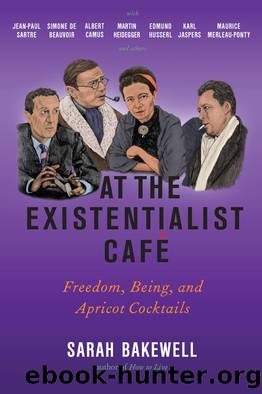At the Existentialist Café: Freedom, Being, and Apricot Cocktails With Jean-Paul Sartre, Simone De Beauvoir, Albert Camus, Martin Heidegger, Maurice Merleau-Ponty and Others by Bakewell Sarah

Author:Bakewell, Sarah [Bakewell, Sarah]
Language: eng
Format: epub, mobi, azw3
Tags: Biography & Autobiography, Literary, Philosophers, Philosophy, Movements, Existentialism
ISBN: 9781590514887
Google: QPNvrgEACAAJ
Amazon: 1590514882
Barnesnoble: 1590514882
Publisher: Other Press
Published: 2016-03-01T06:00:00+00:00
Sartre was just as interested as Beauvoir in seeing how existentialism could be applied to particular lives, and in his case it led him to biography. While Beauvoir traced a generic womanâs life from babyhood to maturity, Sartre did the same with a series of individual men (and they are all men): Baudelaire, Mallarmé, Genet, Flaubert and himself, as well as subjects of shorter essays. In Nausea, he had Roquentin give up his biographical project so as not to impose a conventional narrative form on a life, but there is nothing conventional about Sartreâs biographies. He abandons standard chronology and instead looks for distinctive shapes and key moments on which a life turns â those moments in which a person makes a choice about some situation, and thus changes everything. In these crux points, we catch a person in the very act of turning existence into essence.
The most important such moments tend to occur in childhood. Sartreâs biographies all focus on his subjectsâ early years; Words, his own memoir, confines itself to them exclusively. This interest in childhood owes something to Freud, who also wrote psychobiographies unpicking the dramas of a life, often tracing them to a âprimal sceneâ. Sartre liked to find primal scenes too, but by contrast with Freud they did not usually have to do with sex. Sartre thought sexual experiences took their power from more basic experiences to do with our very being. He sought out those experiences during which a child in a challenging situation took control and bent that situation his own way. In other words, he interpreted his subjectsâ lives in terms of their freedom. This happens above all in his book about the writer Jean Genet, which appeared in 1952 â three years after Beauvoirâs The Second Sex, and visibly marked by her influence.
After first meeting Genet in the Café Flore during the war years, Sartre had followed his career with interest as Genet published erotic, poetic novels and memoirs based on his life in reform schools, prisons, and on the road as a thief and prostitute. His most provocative book, Funeral Rites, told of a French teenager who fights on the German side during the last days of the Occupation, even though the Germans are losing â or rather, because they are losing. Genet tended to sympathise with the defeated or despised in any situation; in 1944 that meant Germans and collaborators, not the triumphant résistants. He went on to support traitors, violent revolutionaries, BaaderâMeinhof terrorists, Black Panthers and more or less anyone who was an outsider. He backed the student radicals of the 1960s too, but remarked to William Burroughs, âIf they ever win, Iâll turn against them.â
Sartre loved Genetâs contrariness, as well as his way of poeticising reality. He was pleased when his publisher Gallimard asked him to write a foreword for a collected edition of Genetâs works. But then Sartreâs foreword grew to be 700 pages long. Rather than whacking Sartre over the head with the manuscript in
Download
At the Existentialist Café: Freedom, Being, and Apricot Cocktails With Jean-Paul Sartre, Simone De Beauvoir, Albert Camus, Martin Heidegger, Maurice Merleau-Ponty and Others by Bakewell Sarah.mobi
At the Existentialist Café: Freedom, Being, and Apricot Cocktails With Jean-Paul Sartre, Simone De Beauvoir, Albert Camus, Martin Heidegger, Maurice Merleau-Ponty and Others by Bakewell Sarah.azw3
This site does not store any files on its server. We only index and link to content provided by other sites. Please contact the content providers to delete copyright contents if any and email us, we'll remove relevant links or contents immediately.
What's Done in Darkness by Kayla Perrin(26591)
The Fifty Shades Trilogy & Grey by E L James(19077)
Shot Through the Heart: DI Grace Fisher 2 by Isabelle Grey(19057)
Shot Through the Heart by Mercy Celeste(18935)
Wolf & Parchment: New Theory Spice & Wolf, Vol. 10 by Isuna Hasekura and Jyuu Ayakura(17110)
Python GUI Applications using PyQt5 : The hands-on guide to build apps with Python by Verdugo Leire(16988)
Peren F. Statistics for Business and Economics...Essential Formulas 3ed 2025 by Unknown(16873)
Wolf & Parchment: New Theory Spice & Wolf, Vol. 03 by Isuna Hasekura and Jyuu Ayakura & Jyuu Ayakura(16823)
Wolf & Parchment: New Theory Spice & Wolf, Vol. 01 by Isuna Hasekura and Jyuu Ayakura & Jyuu Ayakura(16443)
The Subtle Art of Not Giving a F*ck by Mark Manson(14352)
The 3rd Cycle of the Betrayed Series Collection: Extremely Controversial Historical Thrillers (Betrayed Series Boxed set) by McCray Carolyn(14128)
Stepbrother Stories 2 - 21 Taboo Story Collection (Brother Sister Stepbrother Stepsister Taboo Pseudo Incest Family Virgin Creampie Pregnant Forced Pregnancy Breeding) by Roxi Harding(13621)
Scorched Earth by Nick Kyme(12767)
Drei Generationen auf dem Jakobsweg by Stein Pia(10964)
Suna by Ziefle Pia(10888)
Scythe by Neal Shusterman(10334)
International Relations from the Global South; Worlds of Difference; First Edition by Arlene B. Tickner & Karen Smith(9520)
Successful Proposal Strategies for Small Businesses: Using Knowledge Management ot Win Govenment, Private Sector, and International Contracts 3rd Edition by Robert Frey(9366)
The Ultimate Python Exercise Book: 700 Practical Exercises for Beginners with Quiz Questions by Copy(9287)
